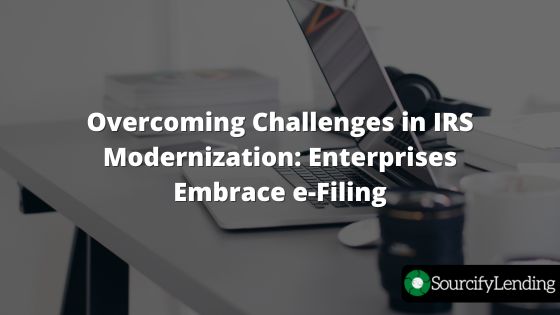Overcoming Challenges In IRS Modernization: Enterprises Embrace E-Filing
In today’s rapidly evolving digital landscape, the Internal Revenue Service (IRS) is undergoing a significant modernization effort, aimed at streamlining tax processes and embracing electronic filing (e-filing) systems. While this transition promises greater efficiency and accessibility, it also presents challenges for enterprises navigating the shifting tax landscape.
One of the key challenges lies in the adaptation to new IRS systems and protocols. As businesses embrace e-filing, they must ensure compatibility with the IRS’s modernized infrastructure, which requires updates to internal processes and technologies. This transition demands careful planning and coordination to minimize disruptions and ensure compliance with evolving tax requirements.
Moreover, the IRS modernization efforts introduce complexities in data management and security. With the digitization of tax records and sensitive financial information, enterprises face heightened concerns regarding data privacy and cybersecurity. Safeguarding sensitive data against potential breaches and cyber threats becomes paramount in the e-filing era, necessitating robust security measures and compliance frameworks.
Additionally, enterprises must navigate the evolving regulatory landscape accompanying IRS modernization. Changes in tax laws and reporting requirements necessitate ongoing adaptation and compliance efforts, adding layers of complexity to tax management processes. Staying abreast of regulatory updates and implementing necessary adjustments pose ongoing challenges for businesses striving to maintain compliance and minimize tax liabilities.
Despite these challenges, enterprises stand to benefit significantly from embracing e-filing and IRS modernization initiatives. By leveraging electronic tax filing systems, businesses can streamline tax processes, reduce paperwork, and enhance operational efficiency. The transition to digital tax solutions enables faster processing times, improved accuracy, and greater accessibility to tax-related information, ultimately driving productivity and cost savings for enterprises.
Moreover, e-filing facilitates seamless communication between businesses and the IRS, enabling real-time tracking of tax submissions and status updates. This enhanced transparency and visibility empower enterprises to better manage their tax obligations and make informed financial decisions, fostering greater confidence and trust in the tax system.
As enterprises navigate the complexities of IRS modernization, partnering with experienced financial service providers can offer invaluable support and expertise. SourcifyLending, for instance, provides tailored financial solutions designed to assist small business owners in navigating the evolving tax landscape. From tax planning and compliance assistance to financing options, SourcifyLending offers comprehensive support to help businesses thrive amidst IRS modernization efforts.
By leveraging SourcifyLending’s expertise and resources, small business owners can effectively navigate the challenges of IRS modernization, optimize their tax processes, and seize opportunities for growth and success in the digital era. With the right support and strategies in place, enterprises can confidently embrace e-filing and IRS modernization initiatives, unlocking new possibilities for efficiency, compliance, and innovation in tax management.

